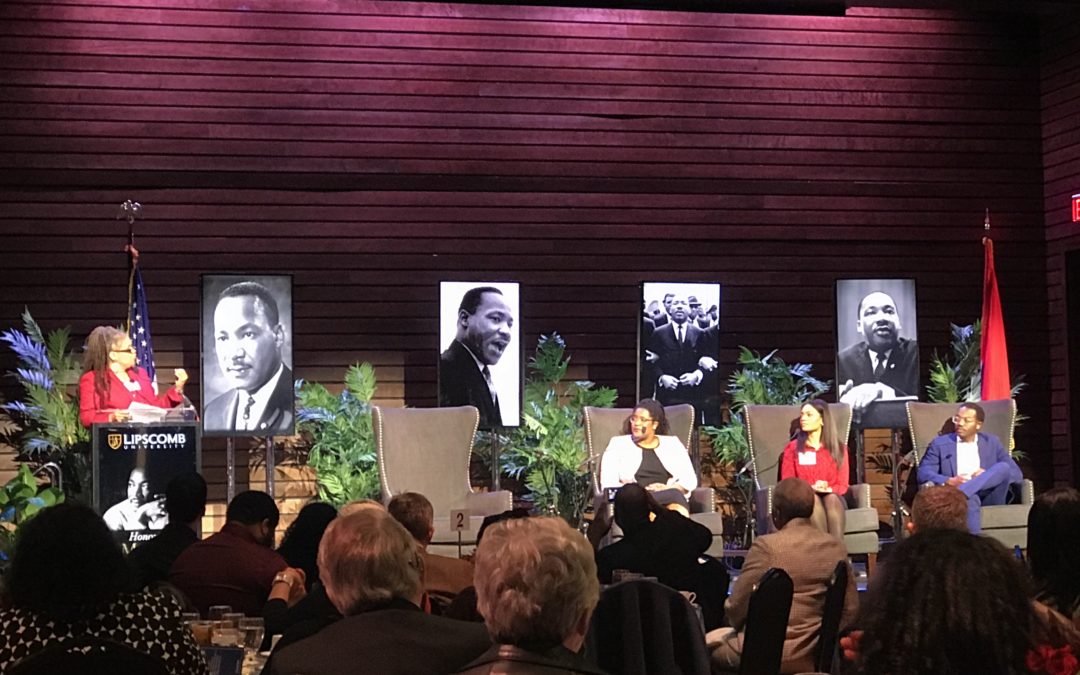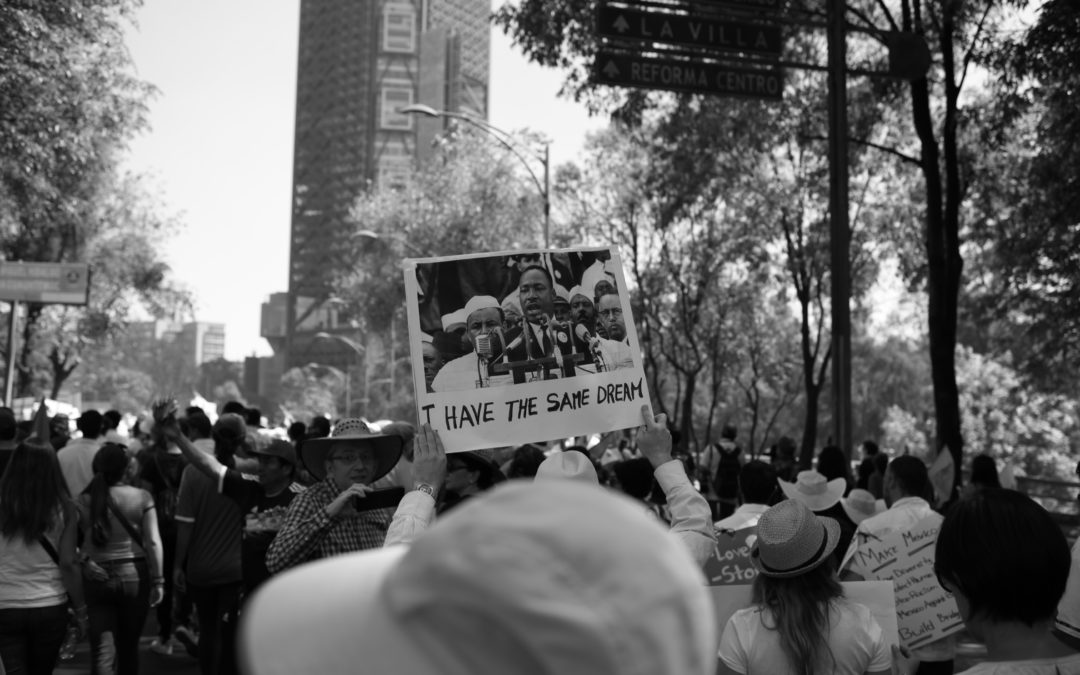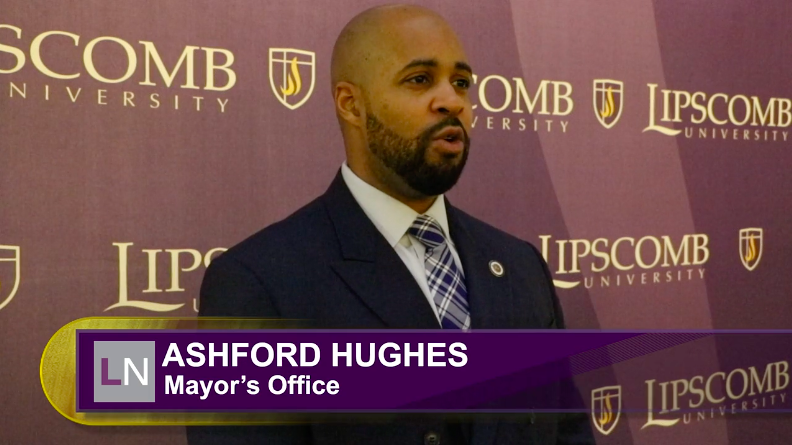
by Taylor McKnight | Jan 23, 2020 | News Slider
Lipscomb University hosted a dinner Tuesday night to honor the life of Dr. Martin Luther King Jr. In past years this event was a breakfast event, but this year, university officials elected to switch things up, and it turned into a birthday celebration. The dinner honored the life, the legacy and the impact Dr. King continues to have even today. To open the evening, musical duo Ovation sang Stevie Wonder’s “The Birthday Song” and dedicated it to Dr. King. Norma Burgess, associate provost for diversity, inclusion and special initiatives, related her excitement about this occasion as well as her hopes for the future of this dinner and what it means, especially today. “The room looks great, the people look great and I’m ready for a party!” Burgess said. “I expect in years to come for this dinner to get bigger and better. “I want those who attend tonight’s event to remember they were at Lipscomb, and yes, this is happening at Lipscomb,” she said. “I want them to hear specifically more about Martin Luther King and to see and meet people whom they can aspire to become.” Many students, faculty and staff, and friends from all over gathered together for this dinner to hear about Dr. King, what he fought for, equality for all people of any color or origin, and how to continue what he started. A panel discussion featured four African-American professionals who shared their perspective on Dr. King and how they relate his words to their lives today. MaryAnne Howland, founder and CEO of Ibis Communications, moderated the panel discussion. Before it began, she talked about Dr. King...

by Konnor Gottfred | Feb 10, 2019 | News Slider, Opinion
Dr. Martin Luther King Jr. was a paradigm for the effective and positive use of the First Amendment. While he may be gone, his legacy has endured and, in his time, Dr. King made great strides in bringing awareness to and speaking out against the racial injustice that plagued 20th century America. Growing up and continuing to live in highly segregated areas of the South, Dr. King was certainly no stranger to discrimination. At that time, the idea of separate but equal was largely ingrained and accepted within American culture until the overturning of the Supreme Court’s Plessy v. Ferguson case and by the landmark decision made in Brown v. Board of Education in 1954. After that, attitudes throughout the nation began to shift, but the roots that had been implanted within society would be slow to recede, leading to conflicts and protests in the years to come. In fact, about a year later, Dr. King found himself in the middle of the Montgomery Bus Boycott. He acted as the protest’s primary spokesperson, and by utilizing his rhetorical ability earned through his years of getting a doctorate in divinity, he declared a vocal and public opposition to the continuing problem of segregation. After Montgomery, Dr. King went for the heart of racial tensions in America: Birmingham, Alabama. In Birmingham, it was his act of civil disobedience towards an ordinance issued to delay protesters from gathering that led to his arrest. This arrest, however, would spark his classic penning of “Letter from a Birmingham Jail.” In it, he criticized passivity and the notion that the solution to segregation was time...

by LeBron Hill | Jan 21, 2019 | News Slider
This year’s MLK Diversity Breakfast featured mayor’s office Chief Equity Officer Ashford Hughes as keynote speaker. Lumination reporter Lebron Hill was there to report and speak to Lipscomb faculty and guests as they reflected on the legacy of Martin Luther King Jr. and shared their perspectives on the importance of inclusion to our...
by D'Nashia Jenkins | Feb 3, 2015 | News Slider
Lipscomb students united in Shamblin Theater Monday night to kick off Black History Month. Marketing events coordinator, Carly Detzner, and President of Kappa Iota Theta, Melba Buchanan, put together this year’s black history month event, which began with a slide show of facts about famous African American people. The event was meant to be a fun event for students to come together and talk about black history month. Students enjoyed various forms of entertainment such as music, food and drinks. The focus for 2015 is around African American students at Lipscomb University and celebrating unity. “Celebrate unity and Martin Luther King Jr., that was his goal,” Detzner said. “He wanted us to be unified with everybody. He didn’t want to oppress the oppressors. He wanted to just be unified, so we are celebrating that unity that we have out here on Lipscomb’s Campus.” A short film was played in reference to Martin Luther King Jr. and his vision of unity and dream to change the world. After the film, students discussed it and related it to today’s society. Buchanan led the event offering questions for the students to discuss. Some of the questions included, “How the world would differ today if MLK did not exist?” Some students felt people would not have taken the same approach as MLK did with peaceful and non-violent protest. Buchanan also asked in what ways people can practice unity as Lipscomb students. Several answers from students were that they believed if they stop defining each other by the color of their skin that they can come together as one and be unified. Other events for Black History Month will be held on campus...
by Aaron Schmelzer | Jan 22, 2014 | News Slider
A member of one of Ebony magazine’s Coolest Black Families in America stopped by Tuesday’s Gathering to share words of wisdom concerning the philosophy of Martin Luther King Jr. T.B. Boyd, III, president and CEO of R.H. Boyd Publishing and a leader in church supplies production, expressed his thoughts about faith and the impact of King’s dream that shaped his conviction to stand against mistreatment. Boyd is a member of Mount Olive Missionary Baptist Church. He began by speaking about his faith and the role he believes it should play in our lives. “We as Americans must bear witness and live plain to the fact that the Lord must still be in the blessing business, passionately in the blessing business,” Boyd said. “We have a God who blessed us with the ability to dream, and dream we must do.” Boyd then transitioned into the dream of King. “I know that all of us have something in common with the dream of Martin Luther King,” Boyd said. “[He] dreamt of freedom and equality.” He spoke about the scrutiny that African-Americans faced before and during the civil rights movement. The opposition burned buildings and harassed those who stood for the movement. Boyd said that in the face of opposition, King encouraged the protesters to remain non-violent, which was a powerful philosophy to King. “Unarmed truth and unconditional love will have the final word in reality,” Boyd said. Boyd said that people still must adapt to the change that King presented and to continue to be generous in our everyday living. “Dr. King’s legacy should tell us that we as a nation are going...




